反义疑问句
反意疑问句

反意疑问句1.反意疑问句篇1归纳:1)由两部分组成:前一部分陈述,后一部分提问。
2)如果前一部分用肯定形式,后一部分就用否定形式;如果前一部分用否定,后,部分就用肯定形式。
即:前肯后否,前否后肯。
3)如果前句的谓语是行为动词,则反意疑问部分需借助助词do, don’tdose doesn’t或did(didn’t),需使用哪一个,视乎时态、人称而定。
一些特殊的反意疑问句:1.陈述部分的主语是i'm...句型时,疑问部分要用 aren't i。
如:i'm an english teacher, aren't i? 我是一名英语老师,不是吗?2.陈述部分是感叹句时,疑问部分用be +主语。
如:what beautiful hats, aren't they? 多么漂亮的帽子,不是吗?3.陈述部分是省去主语的祈使句时,疑问部分用will you。
如:don't be late next time, will you? 下次不要迟到了,好吗?come here, will you / won't you? 到这儿来,好吗?注意: let's 开头的祈使句,疑问部分用shall we, let us 开头的祈使句,疑问部分用will you。
如: let's start with the song, shall we? 咱们以这首歌开始,好吗?let us help you, will you? 让我帮助你,好吗?4.陈述部分的谓语是wish,疑问部分要用may +主语。
如:i wish to go to beijing, may i? 我希望去北京,好吗?5.陈述部分用 no, nothing, nobody, never, few, seldom, hardly, rarely, little等否定含义的词时,疑问部分用肯定含义。
反义疑问句
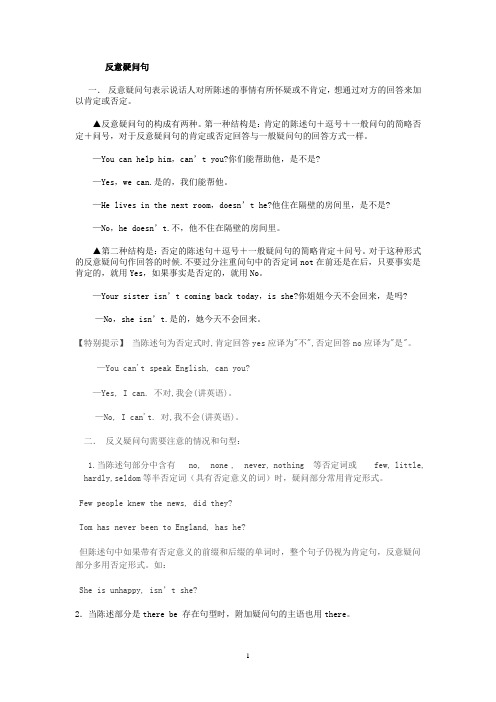
反意疑问句一.反意疑问句表示说话人对所陈述的事情有所怀疑或不肯定,想通过对方的回答来加以肯定或否定。
▲反意疑问句的构成有两种。
第一种结构是:肯定的陈述句+逗号+一般问句的简略否定+问号,对于反意疑问句的肯定或否定回答与一般疑问句的回答方式一样。
—You can help him,can’t you?你们能帮助他,是不是?—Yes,we can.是的,我们能帮他。
—He lives in the next room,doesn’t he?他住在隔壁的房间里,是不是?—No,he doesn’t.不,他不住在隔壁的房间里。
▲第二种结构是:否定的陈述句+逗号+一般疑问句的简略肯定+问号。
对于这种形式的反意疑问句作回答的时候.不要过分注重问句中的否定词not在前还是在后,只要事实是肯定的,就用Yes,如果事实是否定的,就用No。
—Your sister isn’t coming back today,is she?你姐姐今天不会回来,是吗?—No,she isn’t.是的,她今天不会回来。
【特别提示】当陈述句为否定式时,肯定回答yes应译为"不",否定回答no应译为"是"。
—You can't speak English, can you?—Yes, I can. 不对,我会(讲英语)。
—No, I can't. 对,我不会(讲英语)。
二.反义疑问句需要注意的情况和句型:1.当陈述句部分中含有 no, none , never, nothing 等否定词或 few, little, hardly,seldom等半否定词(具有否定意义的词)时,疑问部分常用肯定形式。
Few people knew the news, did they?Tom has never been to England, has he?但陈述句中如果带有否定意义的前缀和后缀的单词时,整个句子仍视为肯定句,反意疑问部分多用否定形式。
反义疑问句例句20个
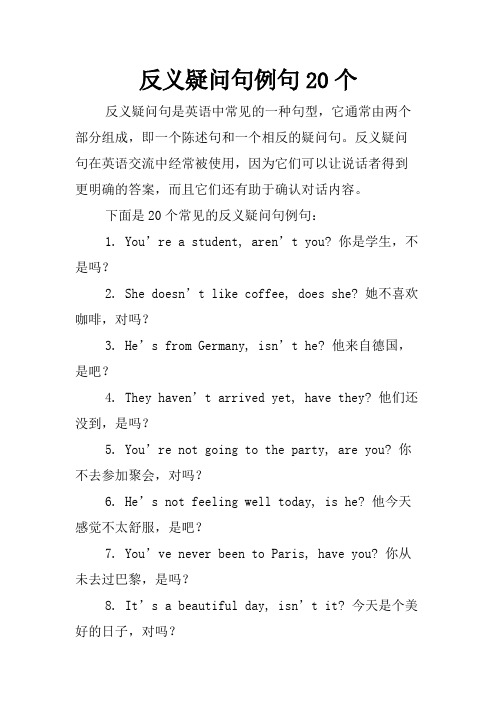
反义疑问句例句20个反义疑问句是英语中常见的一种句型,它通常由两个部分组成,即一个陈述句和一个相反的疑问句。
反义疑问句在英语交流中经常被使用,因为它们可以让说话者得到更明确的答案,而且它们还有助于确认对话内容。
下面是20个常见的反义疑问句例句:1. You’re a student, aren’t you? 你是学生,不是吗?2. She doesn’t like coffee, does she? 她不喜欢咖啡,对吗?3. He’s from Germany, isn’t he? 他来自德国,是吧?4. They haven’t arrived yet, have they? 他们还没到,是吗?5. You’re not going to the party, are you? 你不去参加聚会,对吗?6. He’s not feeling well today, is he? 他今天感觉不太舒服,是吧?7. You’ve never been to Paris, have you? 你从未去过巴黎,是吗?8. It’s a beautiful day, isn’t it? 今天是个美好的日子,对吗?9. He can’t swim, can he? 他不会游泳,对吗?10. She doesn’t like pizza, does she? 她不喜欢披萨,对吗?11. You’re not afraid of heights, are you? 你不怕高,对吗?12. They won’t be able to attend the meeting, will they? 他们不能参加会议,对吗?13. They’re leaving tomorrow, aren’t they? 他们明天要走了,对吗?14. He’s never been skiing, has he? 他从未滑过雪,对吗?15. She’s not going to the concert, is she? 她不去音乐会,对吗?16. You’re not worried about the exam, are you? 你不担心考试吧,对吗?17. He didn’t eat breakfast this morning, did he? 他今天早上没吃早餐,对吗?18. They’r e not going to the beach, are they? 他们不去海边,对吗?19. You’ve already seen the movie, haven’t you? 你已经看过这部电影了,对吗?20. He’s not coming to the party, is he? 他不来参加聚会,对吗?在使用反义疑问句时,需要注意的是,它们并不总是表示对话者的不确定或疑虑。
什么是反意疑问句
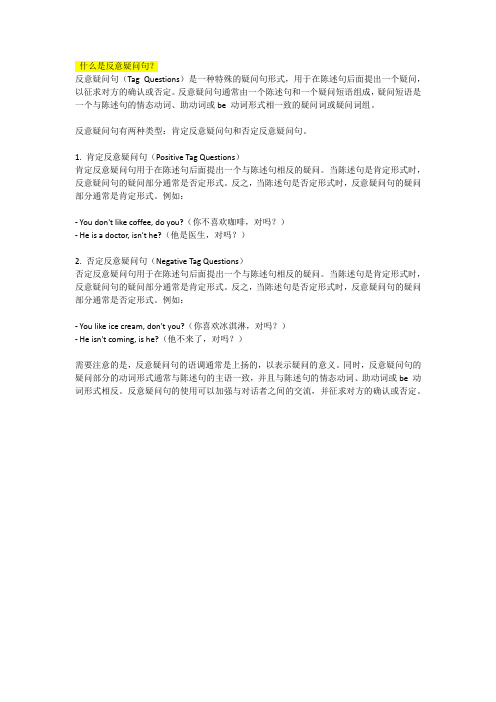
什么是反意疑问句?反意疑问句(Tag Questions)是一种特殊的疑问句形式,用于在陈述句后面提出一个疑问,以征求对方的确认或否定。
反意疑问句通常由一个陈述句和一个疑问短语组成,疑问短语是一个与陈述句的情态动词、助动词或be 动词形式相一致的疑问词或疑问词组。
反意疑问句有两种类型:肯定反意疑问句和否定反意疑问句。
1. 肯定反意疑问句(Positive Tag Questions)肯定反意疑问句用于在陈述句后面提出一个与陈述句相反的疑问。
当陈述句是肯定形式时,反意疑问句的疑问部分通常是否定形式。
反之,当陈述句是否定形式时,反意疑问句的疑问部分通常是肯定形式。
例如:- You don't like coffee, do you?(你不喜欢咖啡,对吗?)- He is a doctor, isn't he?(他是医生,对吗?)2. 否定反意疑问句(Negative Tag Questions)否定反意疑问句用于在陈述句后面提出一个与陈述句相反的疑问。
当陈述句是肯定形式时,反意疑问句的疑问部分通常是肯定形式。
反之,当陈述句是否定形式时,反意疑问句的疑问部分通常是否定形式。
例如:- You like ice cream, don't you?(你喜欢冰淇淋,对吗?)- He isn't coming, is he?(他不来了,对吗?)需要注意的是,反意疑问句的语调通常是上扬的,以表示疑问的意义。
同时,反意疑问句的疑问部分的动词形式通常与陈述句的主语一致,并且与陈述句的情态动词、助动词或be 动词形式相反。
反意疑问句的使用可以加强与对话者之间的交流,并征求对方的确认或否定。
反意疑问句
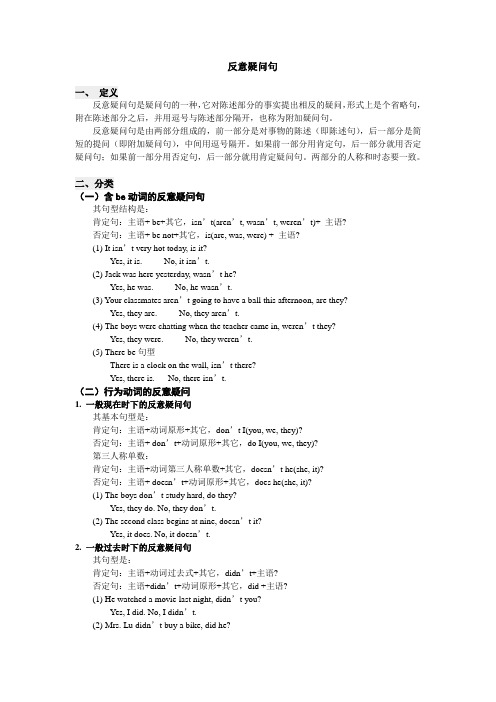
反意疑问句一、定义反意疑问句是疑问句的一种,它对陈述部分的事实提出相反的疑问,形式上是个省略句,附在陈述部分之后,并用逗号与陈述部分隔开,也称为附加疑问句。
反意疑问句是由两部分组成的,前一部分是对事物的陈述(即陈述句),后一部分是简短的提问(即附加疑问句),中间用逗号隔开。
如果前一部分用肯定句,后一部分就用否定疑问句;如果前一部分用否定句,后一部分就用肯定疑问句。
两部分的人称和时态要一致。
二、分类(一)含be动词的反意疑问句其句型结构是:肯定句:主语+ be+其它,isn’t(aren’t, wasn’t, weren’t)+ 主语?否定句:主语+ be not+其它,is(are, was, were) + 主语?(1) It isn’t very hot today, is it?Yes, it is.No, it isn’t.(2) Jack was here yesterday, wasn’t he?Yes, he was. No, he wasn’t.(3) Your classmates aren’t going to have a ball this afternoon, are they?Yes, they are.No, they aren’t.(4) The boys were chatting when the teacher came in, weren’t they?Yes, they were.No, they weren’t.(5) There be句型There is a clock on the wall, isn’t there?Yes, there is.No, there isn’t.(二)行为动词的反意疑问1. 一般现在时下的反意疑问句其基本句型是:肯定句:主语+动词原形+其它,don’t I(you, we, they)?否定句:主语+ don’t+动词原形+其它,do I(you, we, they)?第三人称单数:肯定句:主语+动词第三人称单数+其它,doesn’t he(she, it)?否定句:主语+ doesn’t+动词原形+其它,does he(she, it)?(1) The boys don’t study hard, do they?Yes, they do. No, they don’t.(2) The second class begins at nine, doesn’t it?Yes, it does. No, it doesn’t.2. 一般过去时下的反意疑问句其句型是:肯定句:主语+动词过去式+其它,didn’t+主语?否定句:主语+didn’t+动词原形+其它,did +主语?(1) He watched a movie last night, didn’t you?Yes, I did. No, I didn’t.(2) Mrs. Lu didn’t buy a bike, did he?Yes, he did. No, he didn’t.3. 一般将来时下的反意疑问句其句型是:肯定句:主语+will+动词原形+其它,won’t+主语?否定句:主语+ won’t +动词原形+其它,will +主语?(1) It won’t stop snowing, will it?Yes, it will. No, it won’t.③Mr. Johnson will visit our school next month, won’t he?Yes, he will. No, he won’t.4. 现在完成时下的反意疑问句其句型是:肯定句:主语+have+动词过去分词+其它,haven’t+主语?否定句:主语+ haven’t +动词过去分词+其它,have +主语?第三人称单数肯定句:主语+has+动词过去分词+其它,hasn’t+主语?否定句:主语+ hasn’t +动词过去分词+其它,has +主语?(1) You have been to the US before, haven’t you?Yes I have. No, I haven’t.(2) Jim hasn’t done his homework, has he?Yes, he has. No, he hasn’t.5. 含有情态动词的反意疑问句其句型是:肯定句:主语+情态动词+动词原形+其它,情态动词否定形式+主语?否定句:主语+情态动词否定形式+动词原形+其它,情态动词+主语?(1) You can speak French, can’t you?Yes, I can. No, I can’t.(2) Andy could swim when he was six, couldn’t he?Yes, he could. No, he couldn’t.(3) The students must study hard, mustn’t they?Yes, they must. No, they needn’t.三、反意疑问句应注意的问题1. 当陈述部分的主语是everybody, everyone, someone, nobody, somebody等不定代词时,反意疑问句部分中的主语常用they。
反义疑问句的类型

反义疑问句一、反义疑问句概念:反意疑问句是附加在陈述句之后,对陈述句所表示的事实或观点提出疑问的句子.附加疑问实际上是一种简略的一般疑问句.反意疑问句=陈述句+一般疑问句两种情况:(1)肯定陈述句+否定的一般疑问句“前肯后否”(2)否定陈述句+肯定的一般疑问句“前否后肯”二、反义疑问句类型1. 陈述句含有助动词、情态动词、be动词的情况:A. 肯定陈述句(主语+助动词/情态动词/be动词+其他), 否定一般疑问句(助动词/情态动词/be动词+ not +主语/代词)·He is your teacher, isn't he? (be动词)·She does her homework everyday, doesn't she? (助动词)·They have a house in town, haven't they? (情态动词)·You'd better change your wet skirt, hadn't you? (情态动词)B. 否定陈述句(主语+助动词/情态动词/be动词),肯定一般疑问句(助动词/情态动词/be动词+ not +主语/代词)People shouldn't drop litter on the pavements, should they?(情态动词)There wasn't enough time at that moment, was there? (be动词)He doesn't do the work, does he? (助动词)2. 陈述句含有实义动词的情况:A. 肯定陈述句(主语+实义动词+其他),否定的一般疑问句(助动词do/does/did + not +主语/代词)·You found the key in the bedroom,didn't you?·Everybody knows the answer, don't they?B. 否定陈述句(主语+do/does/did + not+实义动+其他),肯定的一般疑问句(助动词do/does/did+主语/代词+其他)·Your mother doesn't like apple, does she?3. 特殊句型的反意疑问句(1)陈述句含有I +be动词句型,附加疑问句用are / aren't+ I回答。
反义疑问句
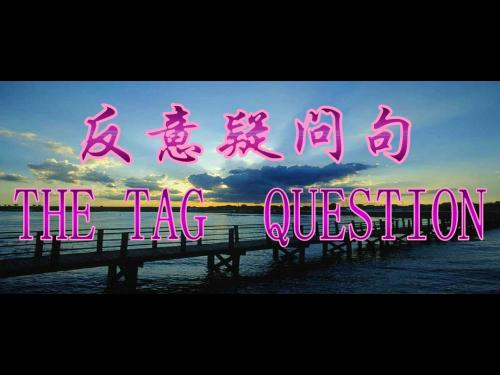
9.陈述部分的主语是I,疑问部 分要用 aren't I. I’m as tall as your sister, ____________? aren't I aren’t I I am a stude问 部分用will you。 will you Don't do that again, _________?
• Nothing is serious , _______ ?
Everyone is in the classroom, ___________?
Everything begins to grow in spring, __________?
Nobody will go, _________?
7.陈述部分有had better + v. 疑 问句部分用hadn't you?
3.陈述部分用 no, nothing, nobody, none,never, few, little, seldom(很少), hardly(几乎 不), 等否定含义的词时,疑问 部分用肯定含义。 Miss Swede made no answer, did she ___________? He can hardly understand it , ___________ ? can he
• He dislikes English, ___________? • You were careless , ___________? • He is unhappy, ___________?
5.主语为指人的不定代词 everyone、everybody、 someone、somebody、 anyone、anybody、no one、 nobody时,附加疑问句的主语 用 they/he .
反意疑问句

前否后肯
b. 否定的陈述部分 + __肯__定__的__疑__问__句___( __b__e_/_助__/情____ + 主语) ?
反意疑问句的陈述部分常用来表明说话人的观点及想法,再用简略的
问句来征求对方的意见;简略问句的构成与陈述部分的一般疑问句构
成相同;回答仍然用Yes, ... / No, …
__n_e_e__d_n_’_t____w_e_______?
2. 若陈述部分含有be动词,则用be动词构成简略问句。 1) You are from England, aren’t you? 2) She isn’t a teacher,___i_s__s_h__e_____? 3) They were playing basketball this time yesterday,
3. 若陈述部分含有行为动词,则用助动词构成简略问句。
1) They saw the movie, didn’t they?
2) Tom read books on English just now, didn’t he
_____________?
does she
3) She doesn’t like apples, _______________?
5. 若陈述部分句子为 think, believe, suppose, guess等引 导的从句, 主语为一人称, 并且主句为一般现在时态, 简略问句的 构成应以从句为准。 (主现看从句) 1) I don’t think you are right, are you? 2) I am sure he will come, __w__o_n_’_t___h_e_______? 3) We don’t believe he is from America, __is___h__e_____?
- 1、下载文档前请自行甄别文档内容的完整性,平台不提供额外的编辑、内容补充、找答案等附加服务。
- 2、"仅部分预览"的文档,不可在线预览部分如存在完整性等问题,可反馈申请退款(可完整预览的文档不适用该条件!)。
- 3、如文档侵犯您的权益,请联系客服反馈,我们会尽快为您处理(人工客服工作时间:9:00-18:30)。
反义疑问句反意疑问句是指先陈述一件事,再用省略的一般疑问句附加在其后构成的疑问句。
通常用yes/no回答。
对于反意疑问句,我们必须知道的基本规则:1、反意疑问句的陈述部分如果是肯定,附加的一般疑问句就用否定形式;如果陈述部分是否定,则附加部分用肯定形式。
(我们可以这样记忆这条规则:前肯后否,前否后肯)如:This is a book, isn’t it?This is not a book, is it?You can speak some Engli sh, can’t you?You can’t speak any English, can you?2、反意疑问句的附加部分(疑问句)的主语一定要用人称代词充当(前句为there be句型除外,在那样的情形里,句尾还用there),如果后部分是否定,一定要用缩写形式。
(前部分为I am…时,后部分用aren’t I?)如:I am a teacher, aren’t I?There will be a meeting, won’t there?※反意疑问句的构成①肯定的陈述句+ 否定的简略问句----------前肯后否例.Beijing is a beautiful city ,isn’t it?②否定的陈述句+肯定的简略问句---------前否后肯例You won’t be away for long, will you?※注意:①反意疑问句前后两部分谓语应是,“肯定陈述+否定疑问”或“否定陈述+肯定疑问”②简略问句如果是否定式,not应与be,do,will等系动词、助动词、情态动词缩写③简略问句的主语不用名词,应用人称代词※解题步骤:①看陈述句的时态,找be动词/情态动词/助动词have、has、had 、do、does、did②判断陈述部分肯定与否,再确定后半部分的肯定与否③看陈述句的主语,找出对应的人称代词(there be 句型除外)※反意疑问句的类型:①含系动词be 的------be(not) + 代词He is a teacher,_________They were at home yesterday,_____________You aren’t students,__________She wasn’t in the room,________②含情态动词(could /can /shall /should /will /would /may)-----情态动词(not)+代词He can speak English,_____________?Lily will watch TV tomorrow,___________?He'd like to go to the movies with me ,____________?He shouldn’t copy others’ homework ,_____________?Kids won’t go to school ,___________________?③含有助动词have/has/had-----当陈述部分的谓语是由“have/has/had + 动词的过去分词”构成时,此时have/has/had是助动词,用来构成“现在完成时和过去完成时”。
如:Tom has been to Beijing twice,hasn’t he?Tom到过两次北京,是吗?Mary’s parents have nev er visited the Great Wall,have they?Mary的父母从来没参观过长城,是吗?Many people had hardly used the computer before 1990,had they?在1990年之前许多人几乎没使用过电脑,是吗?He hasn’t been to Shanghai,_____________?He has been skating for 4 hours ,_________________?They haven’t been to the amusement park ,___________?You have seen the film many times ,_____________?④含有助动词do/does/did -----当陈述部分没有be动词或情态动词,而只有行为动词时,我们就要借助于助动词do/does/did来构成反意疑问句。
如:He has a lot of money, doesn’t he? 他有许多钱,是吗?You have a new bike,don’t you? 你有一辆新自行车,是吗?They had a good time in the park last Sunday,didn’t they?[小试身手]He is from Japan ,_________?They are watching TV now ,__________?She is going to play basketball ,__________?Jack wasn’t ill yesterday , ___________?Tom and Jack were walking along the street at that time ,______________?You want to improve our English ,_______________?Jack looks like her father ,__________________?Linda went to the zoo three times last year ,__________?People will have robots in their homes ,______________?Books will only be on computers,_________________?He can swim very well ,__________________He needn’t clean the room now ,______________?You need to improve your English ,________________?※【反意疑问句的常见考点】1. 陈述句中含有seldom(不常)、hardly(几乎不)、nobody(没人)、nothing (没有什么)、never(从不)、none(一个也没有)、neither(两者都不)、few(几乎没有)、little(几乎没有)等表示否定意义的词,疑问部分常用肯定形式。
如:Few people knew the news, did they?Tom has never been to England, has he?( )① There is little milk in the bottle, ______?A. isn’t itB. is itC. isn’t thereD. is there( )② He has few friends in the new school, ______?A. has heB. is heC. does heD. did he ( )③ You’ve never seen such a wonderful film before, ______?A. haven’t youB. have youC. do youD. don’t you ( )④ Peter could hardly see the words on the blackboard, _____?A. did heB. couldn’t heC. didn’t heD. could he( )⑤ Few of them hurt themselves in the accident last night, _______ ?A. don’t theyB. didn’t theyC. did theyD. do they( )⑥ E-mail is very popular today. People seldom write letters now, ______?A. did theyB. do theyC. didn’t theyD. don’t they( )⑦ There is no important information in the newspaper, _______?A. isn’t thereB. is itC. is there( )⑧ Nothing is difficult if you put your heart into it, _______?A. aren’t theyB. isn’t itC. is it( )⑨ ─ Zhou Weilun could hardly speak Engl ish three years ago,______?─ No,he couldn’t.But now he is quite good at it.A. couldn’t heB. could heC. didn’t he2. 祈使句的反意疑问句①基本原则:“(Don’t) + 动词原形+ 其他”这样的祈使句无论否定还是肯定,反意疑问句的疑问部分都用“will you”。
如:Open the door. — Open the door, will you?Don’t talk in class. —Don’t talk in class, will you?Please help us, will you? 请帮帮我们,好吗?Come with us, will you? 同我们一起去,好吗?Don’t forget to post the letter, will you? 请别忘了寄信。
Let us go swimming together, will you? 我们一起去游泳好吗?②Let’s do 和Let us doLet’s…(包含对方,所以后部分用shall we?)Let us…(不包含对方,所以后部分用will you?)如:Let’s play football, shall we?这句话的含义是说话者邀请听话人和他一起去踢足球,所以后部分用人称代词we。
Let us play football, will you?这句话的含义是说话者请求听话人允许他去踢足球,所以后部分用人称代词you。
练一练:( )① Let's go to see the film,_________________?A. will youB. won't youC. shall weD. shan't we( )② Don't forget to close the window,__________________?A. do youB. have youC. will youD. did you( )③ Don't be careless again,__________?A. are youB. do youC. did youD. will you( )④ Let me help you with your English study,__________?A. could IB. shall IC. will youD. would you( )⑤ Go and fetch some water,_____________?A. won't youB. don't youC. shall youD. would you( )⑥ --- Let’s go and fly kites, _____?-- Wonderful!A. will youB. shall weC. don’t youD. do you ( )⑦ John, clean your room, _________?A. will youB. shall weC. don’t youD. doesn’t he ( )⑧ ─ Let’s go to the zoo by taxi,_________________?─ Maybe we can go there ______________.It’s not far.A. won’t you;on footB. won’t you;by footC. shall we;by footD. shall we;on foot1.考察have/has/had作实义动词还是助动词现在完成时have/has + 动词的过去分词过去完成时had + 动词的过去分词练一练:( )① He has few friends in the new school, ______?A. has heB. is heC. does heD. did he( )② Alice had a wonderful time yesterday,__________________?A.hadn’t sheB.was n’t sheC.didn’t sheD.wouldn’t she ( )③ --- Linda had nothing for breakfast this morning, ______?--- No. She got up too late.A. had sheB. hadn’t sheC. did sheD. didn’t she ( )④ Mr. King has never been to France, ______?A. has heB. hasn’t Mr. KingC. hasn’t heD. has Mr. King ( )⑤“You never have noodles, _____ you?” “No. I only like rice.”A. doB. don’tC. haveD. haven’t( )⑥ His sister had a bad cough, _____ she?A. was n’tB. doesn’tC. hadn’tD. didn’t( )⑦ Mary’s brother had a talk at school yesterday afternoon, _______A. had heB. hadn’t heC. did heD. didn’t he( )⑧ You’ve never seen such a wonderful film before, ______?A. haven’t youB. have youC. do youD. don’t you ( )⑨ Liu Qian has made “magic” a hot word,_____ he?A. doesn’tB. didn’tC. hasn’tD. isn’t( )⑩ The boy has a new MP4,______________?A. doesn’t heB. isn’t heC. does heD. is he4.’s 是is还是has的缩写形式练一练:( )① Kate’s never seen Chinese film, ______?A. hasn’t sheB. has sheC. isn’t sheD. is she( )② Zhu Zhiwen’s never been to Hongkong, _______?A. is heB. isn't heC. has heD. hasn't he( )③ He’s fed the dog and the cat, _______?A. doesn’t heB. isn’t heC. wasn’t heD. hasn’t he( )④ ─ He’s already back to Australia,_______________?─ ________________.He is on a visit to Shanghai.A. isn’t he;NoB. hasn’t he;YesC. isn’t he;YesD. hasn’t he;No5.反意疑问句的回答:事实上是肯定的就用Y es,事实上是否定的,就用No,不能出现前面用yes 后用not 或前面用No后面用肯定的现象。
